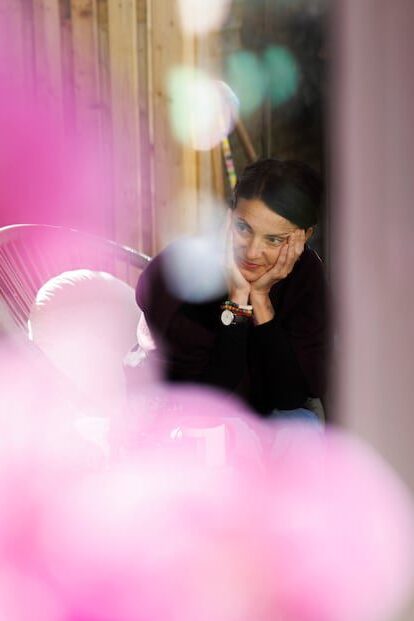Dublin, Ireland – Nevenka Fernández lights a cigarette in the gentle breeze of her Dublin garden, her eyes holding both a deep sadness and quiet resilience. Her story is not simply one of survival—it’s a testament to the enduring power of truth. Twenty-four years have passed since her life took a turn that no one could have predicted, a journey that started in the small town of Ponferrada, Spain, and led her into the headlines as the face of one of the most defining cases of sexual harassment in Spanish history.
“I never expected it to come to this,” she reflects, her voice soft but steady. “But when I look back now, I know I didn’t have a choice. To live, I had to fight.”
The Strength to Speak When Silence Was Expected
In 2002, Nevenka Fernández became the first woman in Spain to publicly accuse a high-ranking politician, Ismael Álvarez, of sexual harassment. It was a case that shook the nation—Álvarez was a powerful figure, a mayor with influence and reputation. Nevenka, only 26 at the time, had no guarantees that her voice would be heard, let alone believed. The fear of retaliation, public shaming, and isolation loomed large. Yet, as she speaks today from her home in Ireland, it is clear that her decision was never about fame or recognition; it was about survival.
“If I hadn’t spoken up, I wouldn’t have been able to keep living,” she explains. “It wasn’t bravery at the time—it was desperation. I felt trapped, and there was no way out but through.”
A Legal Battle that Shaped Spain’s Understanding of Consent
Nevenka’s fight was not just against her aggressor but against a society unprepared to confront the reality of sexual harassment. In the trial, Álvarez was eventually convicted, marking a pivotal moment in Spain’s legal system. He was fined a modest sum—€6,480—but the cultural significance of the conviction was far greater. For the first time, a powerful male figure was held accountable for his actions, and the issue of sexual harassment was thrust into the national conversation.
Yet, the victory came at a cost. “I was treated like a witch being dragged to the stake,” she recalls, her voice firm but her eyes betraying the pain of those memories. The town of Ponferrada turned against her, rallies were held in support of Álvarez, and Nevenka was left isolated, vilified, and with few allies to stand beside her.
“I didn’t just lose a case—I lost my home, my community,” she says, her voice trailing off as she remembers the dark days following the trial.
From Darkness to Dublin: A New Beginning
It was this loss that drove her to leave Spain, searching for a place where she could rebuild her life without the weight of her past constantly pressing down on her. She found refuge in the UK at first, working in a fish and chips shop, far from the courtroom drama that had consumed her life. Later, she made her way to Dublin, where she began anew—working in Airbus, raising her two sons, Neo and Lee, and slowly reclaiming the pieces of herself that had been shattered.
“I needed to go somewhere where I could just be Nevenka,” she shares. “Not Nevenka from the trial, but just me. Ireland became my sanctuary.”
Though the trauma of her past still lingers, Nevenka’s life today is one of quiet joy and fulfillment. Her home is filled with books on meditation, philosophy, and poetry, and she’s found solace in Tibetan Buddhism and yoga, practices that have helped her heal. She now teaches others the lessons she’s learned about resilience and inner peace, though she’s quick to acknowledge that her healing journey is far from over.
“Soy Nevenka”: A Film About Truth, Pain, and Perseverance
Next week, a film about her life, Soy Nevenka, will debut at the San Sebastián Film Festival. Directed by Icíar Bollaín, the film promises to dive deep into the heart of Nevenka’s struggle, showing not just the trial but the personal toll it took on her life. For Nevenka, the film represents more than just a retelling of her story—it is a reminder that her fight was not in vain.
“I’m nervous about the film, I won’t lie,” she says, exhaling a cloud of smoke. “But I think it’s important. There are still so many people, so many women, who are afraid to speak up, who don’t believe that they will be heard. Maybe this film will help change that.”
While Nevenka doesn’t plan to walk the red carpet—“That’s never been my thing,” she laughs—her presence at the festival is symbolic. It marks the next chapter of her journey, one in which she is no longer just a victim, but a woman reclaiming her narrative.
A Legacy of Strength and Compassion
As the world continues to grapple with issues of consent, harassment, and justice, Nevenka’s story stands as a powerful reminder of what can be achieved when one woman refuses to be silenced. Her battle paved the way for future generations, challenging the harmful rhetoric of “she must have done something to deserve it” and opening up conversations about the realities of sexual harassment in Spain and beyond.
Nevenka remains modest about her legacy. “I’m just one person,” she says quietly. “There are so many others, so many women who go through much worse and never get their stories told. If my story can help even one person, then maybe it was worth it.”
And in that sentiment lies the quiet strength of Nevenka Fernández—a strength that has survived the storms of injustice, betrayal, and isolation, only to emerge as a beacon of resilience, truth, and hope for others who are still searching for their own voices.


